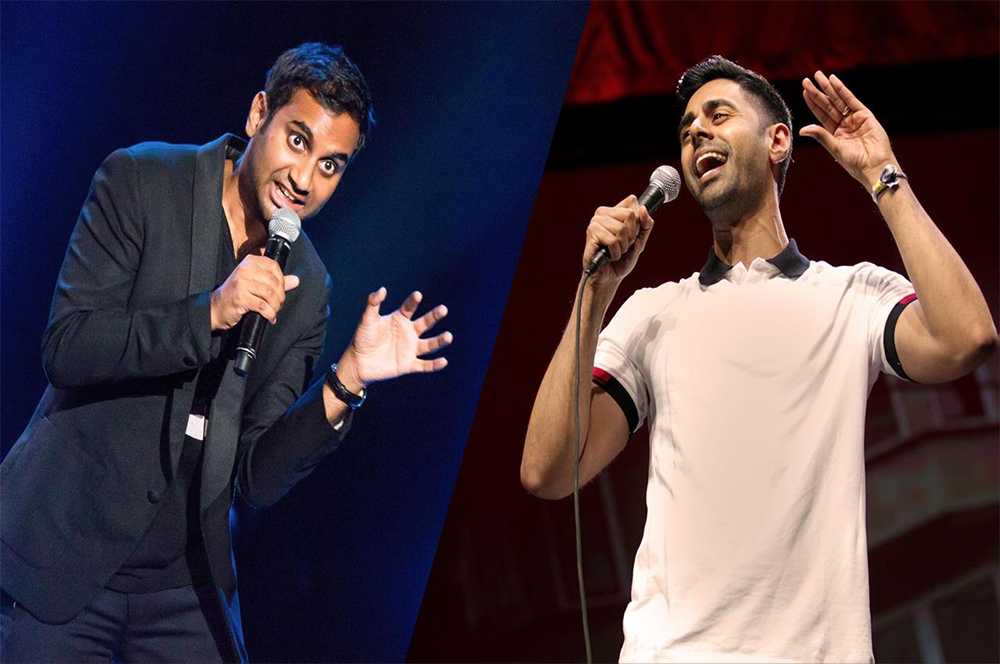They’re equal to the task … of fighting discrimination. Hasan Minhaj, with his recent comedy special, Homecoming King, and Aziz Ansari with the successful series Master of None are reimagining what it means to be a Brown-Indian-American-Muslim.
From anti-Sharia rallies and a young girl’s murder near a Virginia mosque to President Trump ending the 20-year-old tradition of holding the Eid al-Fitr dinner at the White House, American Muslims are feeling under siege. So Minhaj and Ansari’s multifaceted stories about American Muslims are providing much-needed, normalizing counternarratives to those that depict Muslims as terrorists, enemies and hijab-wearing, backward women.
These men use humor and heartfelt comedy to talk about the racism they encountered as children of Muslim immigrants while challenging the constraining cultural norms their parents imposed on them. Takeaways include complex, humane stories about “New Brown Americans” that are being shared within their own communities, and with mainstream America.
I BELIEVE THIS IS AN UNPRECEDENTED MOMENT IN INDIAN-AMERICAN AND SOUTH ASIAN IMMIGRANT HISTORY AND AMERICAN MEDIA.
As a psychologist who’s done extensive research on Indian-American and South Asian identity formation in the U.S., I believe this is an unprecedented moment in Indian-American and South Asian (Indian, Pakistani, Bangladeshi, Sri Lankan, Nepali) immigrant history and American media. My work has shown that Indian-Americans, including many other South Asians, have remained silent, and fearful, in the face of racial discrimination. But all that is changing.
Minhaj tells his audiences that immediately after 9/11 his family received a death threat, and their car was vandalized. Furious, he remembers how calmly his father responded, standing in the middle of the street and “sweeping glass out of the road like he works at a hate-crime barbershop.” Such hatred, his dad says, is the price they pay for being in America: “These things happen, and these things will continue to happen.”
As model minorities in the U.S., Indian-Americans practice colorblind racial views and a politics of accommodation that Minhaj associates with his parents’ generation. Log lya kahenge (“What will people say?”) was a common expression used by his dad in a bid to keep his children within the model-minority cultural script. But Minhaj feels differently; he has what he calls an “audacity for equality” because he was born in the U.S., where the constitution declares everyone equal.
In his first-ever Saturday Night Live monologue, Ansari asked President Trump to clamp down on his supporters’ racism — and their “new, lowercase KKK movement,” describing it as “casual white supremacy.” In his own show, he’s taken on racism he sees playing out in Hollywood. In an episode in which his character goes on an audition, for example, a director asks him to do an Indian accent for a part called an “unnamed cab driver.” Dev, played by Ansari, refuses to mimic an Indian accent, declining to be stereotyped.
Another compelling episode of Master of None shows a close friendship between Denise (Lena Waithe), a Black lesbian, and Dev, a second-generation Indian-American. Such a poignant depiction of genuine and supportive friendship between a desi (South Asian) man and a Black woman has never been seen in American popular culture.
And in this same episode, Denise comes out to her mother, Catherine (Angela Bassett), in an emotionally charged interaction. She says, “I’ve always been gay, but I’m still the same person.” Wiping her tears away, Catherine responds, “I don’t want life to be hard for you. It is hard enough being a Black woman in this world. Now you want to add something else to that?” Ansari and Waithe cowrote this episode, and it is remarkable how deftly they bring to life the varied intersectional struggles of diverse Americans who are coming of age.
Then there’s the labor of love. Minhaj, in Homecoming King, recalls how he once told a girl while playing in a sandbox that he loved her, and the girl responded, “You are the color of poop.” Later, in high school, he developed a crush on his “white princess” friend, Bethany Reed, whom he had met in his AP calculus class. Reed asked him to prom, which, Minhaj says, was one of the most special moments of his life. On prom night, he sneaked out of his house and rode his bike feverishly — while wearing a JCPenney suit — to Reed’s house. But a white boy, the captain of the water polo team, was placing a corsage on Reed’s wrist.
Bethany’s mother offered a devastating excuse: “See, oh my God, honey, I’m so sorry. Did Bethany not tell you? We have a lot of family back in Nebraska, and we’re going to be taking a lot of pictures tonight, and they’re going to see them. And we don’t know if it would be a good fit for us.” Hasan notes that the racism of Reed’s family was more traumatic than the death threat after 9/11. “I didn’t know that people could be bigoted even as they were smiling at you,” Minhaj says. “It’s hard to understand when you see people saying that they love you, but they’re afraid of you at the same time.”
These comic geniuses and their audacity for equality go far beyond challenging flat, racist stereotypes of brown Muslim immigrants. They are telling quintessentially American stories, serving up strong antidotes to the growing anti-Muslim rhetoric of our times.

